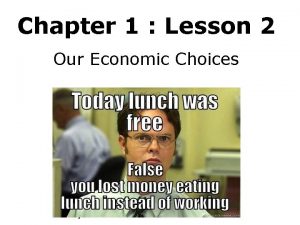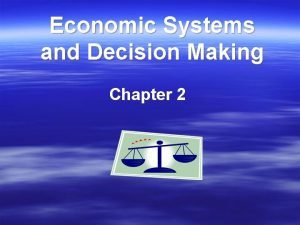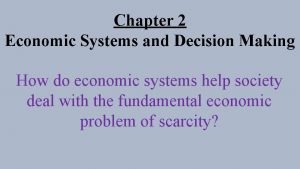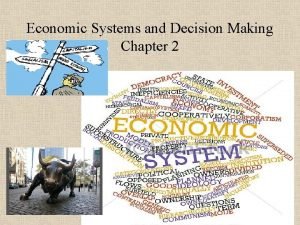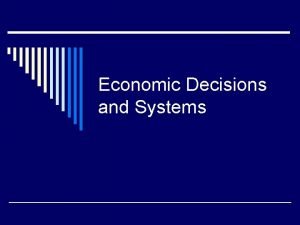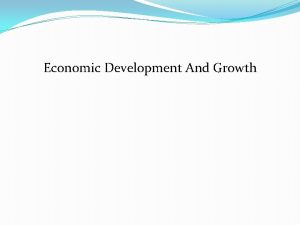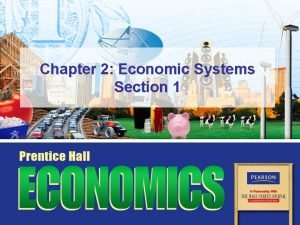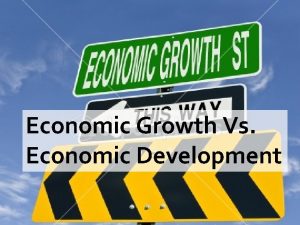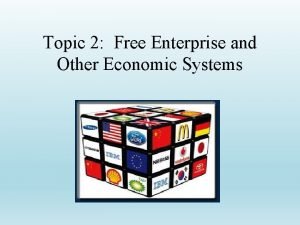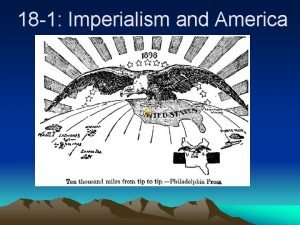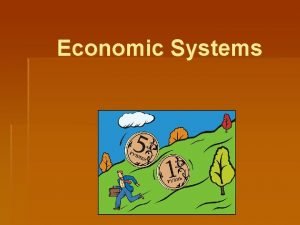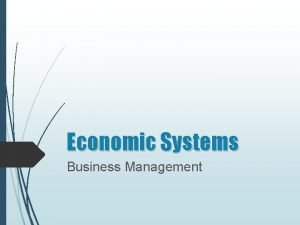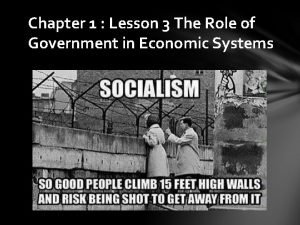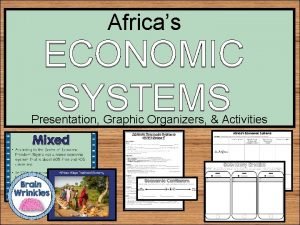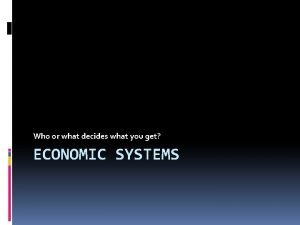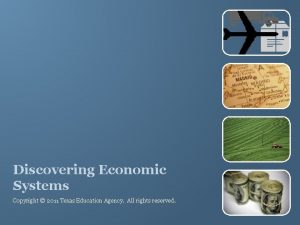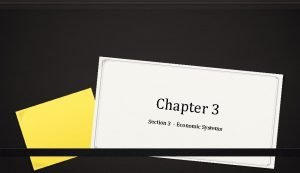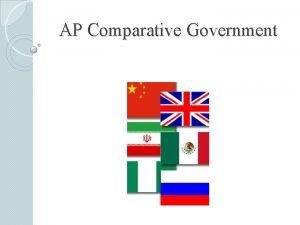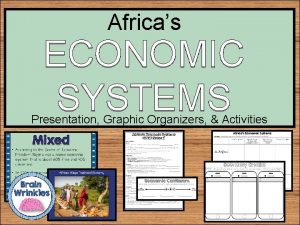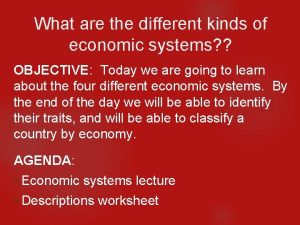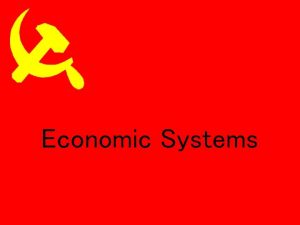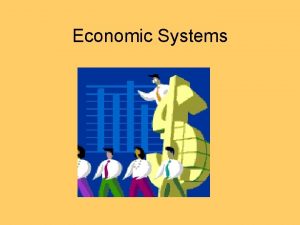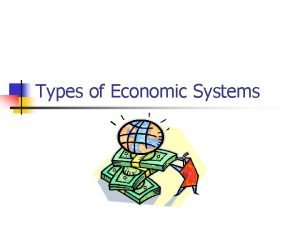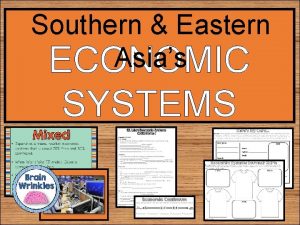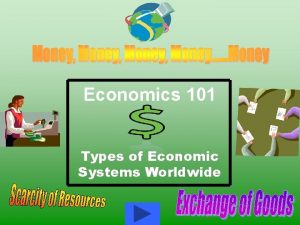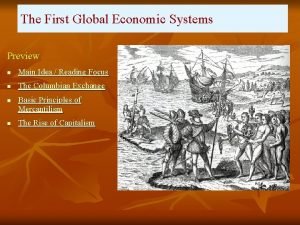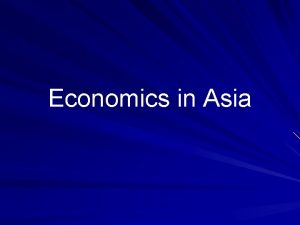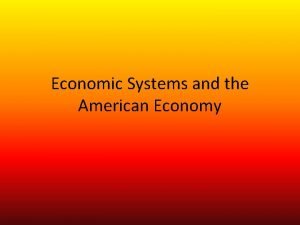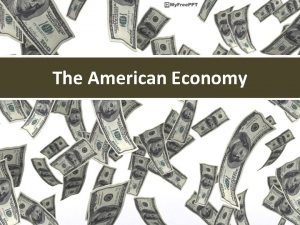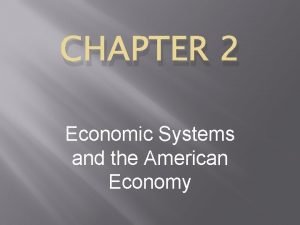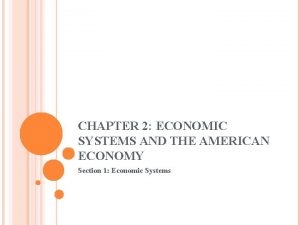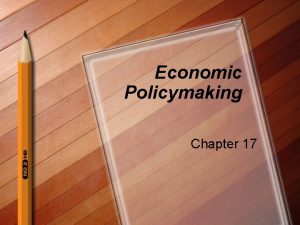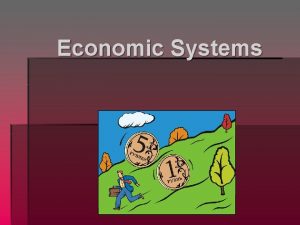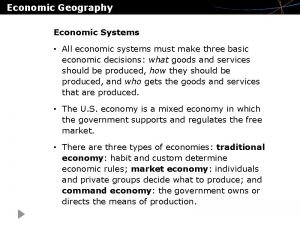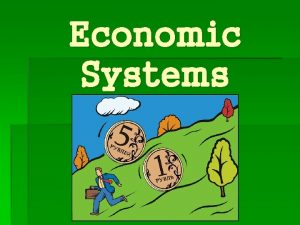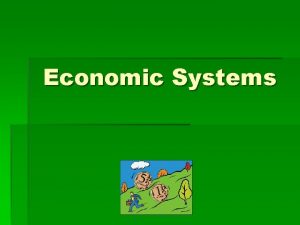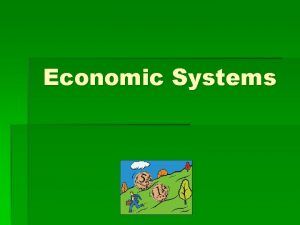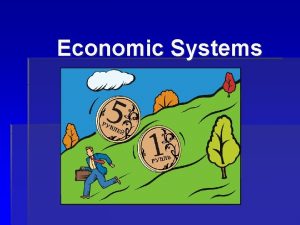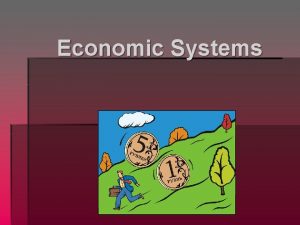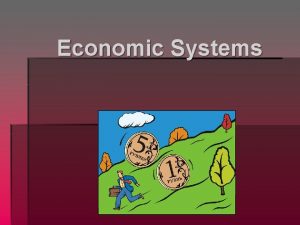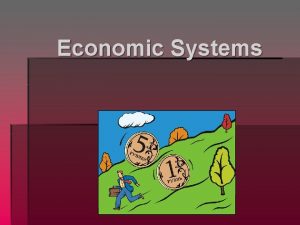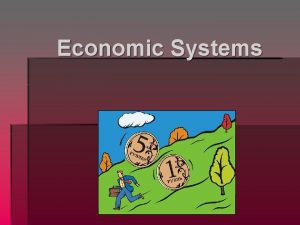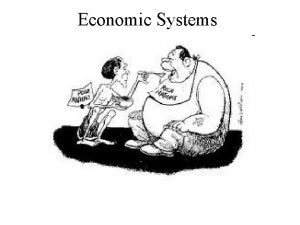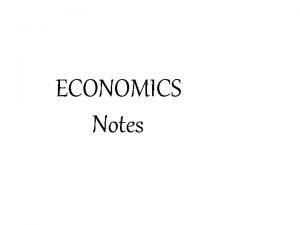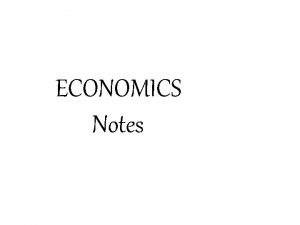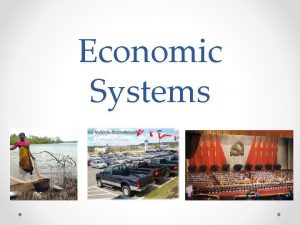Economic Systems and the American Economy Chapter 2































- Slides: 31

Economic Systems and the American Economy Chapter 2

Learning Objective • I can describe the 3 basic questions that all economics systems attempt to answer

Three Basic Questions • Economic System • The way a nation determines how to use its resources to satisfy its people’s needs and wants • What Should Be Produced? • How Should It Be Produced? • For Whom Should It Be Produced?

Learning Objective • I can identify advantages and disadvantages of traditional, market, command, and mixed economic systems.

Types of Economic Systems • • Traditional System Command System Market System Mixed System

Traditional • Questions answered by how they have been done in past. (often religious) • Advantages – Expectations Known – Strong Community • Disadvantages – – Change Discouraged (punished) Inefficient Productions Limited Consumer Choices Little Increase in Standard of Living

Command • Government leaders control FOP and make all decisions (single person or central group) • Disadvantages • Lack of Incentives • Limited Consumer Choices • Advantages • Quick Changes Possible • Necessities at Little or No Cost

Market • Individuals own FOP and therefore make all decisions. • Market – Voluntary Exchange of Goods and Ideas • Prices combination between buyers and sellers. Tells what to buy and produce. • Circular Flow of Income and Output

Market Cont. • Advantages – Freedoms • • Career How to Spend Income Property Ownership Whether to Take Risks – Lots of Choices in Goods Due to Competition – Supply and Demand determine prices • Disadvantages – No concern over elderly, disabled, or too young to work. – Change is Gradual

Mixed • Combines elements of Pure Market and Command. • Individual decision making and private ownership ALONG WITH government intervention and regulation.

Characteristics of the American Economy • • • Limited Role of Government Freedom of Enterprise Freedom of Choice Profit Incentive Competition Private Property

Limited Role of Government • Adam Smith (1776) An Inquiry into the Nature and Causes of the Wealth of Nations – Invisible Hand • Pure Capitalism (Market) – Laissez-Faire – Let people do as they choose. • U. S. – Let People Own Businesses and Industries BUT Must Operate Within Legislative Limits.

Freedom of Enterprise • Private ownership of property and businesses. • Entrepreneurship – YOU TAKE THE RISK • Within Certain Limits However • Zoning Regulations • Child Labor Laws • Consumer Protection Agencies

Freedom of Choice • Buyers (not sellers) make decisions about what to produce • Government Intervention • Sets Safety Standards • Regulates Prices (under limited competiton)

Profit Incentive • Desire to Make a Profit • Provides motivation to improve, make better • Losses? Signal to move elsewhere.

Competition • Requires large number of independent sellers • Encourages Efficiency • Keep Prices Low to Sell • But High Enough for Profits • Must Keep Low Production Costs • Must have little stopping entering and exiting

Private Property • Individual right to buy property whenever you want. • Individual controls how and when to use property. • Constitution guarantees an owner’s right to private property and its use

Goals of Free Enterprise • • • Economic Freedom Efficiency Equity Security Stability Growth

Economic Freedom • Free to Make Choices • Start own Businesses • Own Private Property • Where and When to Work • Must Accept Consequences

Economic Efficiency • Using Limited Resources Wisely • Scarcity a Problem

Economic Equity • Fairness • Lawmakers pass wage laws • Discrimination laws

Economic Security • Protection against things beyond our control • • Work Related Injuries Natural Disasters Bank Failure Old Age

Economic Stability • Reduce ups and downs of Standard Of Living- material wellbeing of individual, group, or nation. • Measured by average value of goods and services used by average citizen during given period of time. • We have more enjoying highest SOL than anywhere in world.

Economic Growth • Producing more goods and services over long term • Must happen WHY? ? ?

Rights and Responsibilities • Rights • Enter any job or profession you want • Can work as hard as you want • Buy what you want • Responsibilities • Ability to support you and family • Become a productive member of Free Enterprise • Electing responsible officials: • Need knowledge of policies • Ability to analyze consequences of policies

Pure Socialism • Government manages Production and Distribution – North Korea, Cuba • Karl Marx – Bourgeoisie vs. Proletariat • Value of Goods Depends on How Much Labor Went Into Production • Bourgeoisie used Proletariat unfairly • Used their labor then kept profits • Capitalism was doomed to fail • Would evolve into Socialism then Communism – System with no need for government • Irony: Today came to mean authoritarian system that supports revolution to gain power. • Proletariat actually has little to no power

Characteristics of Pure Socialism • Prices set by State – Not by Supply and Demand • Movement or Resources (especially Labor) Controlled by the State • Most Factors of Production Owned by the State. Private Property Limited to Tools Needed for Occupation • Risk Taking Not Permitted. State Takes All Risks. Citizens Share in Unsuccessful Risks. • What, How, and for Whom to Produce Made by State Officials

4 Steps in Change to Socialism 1. Extreme Recessions and Depression - Only A Few Wealthy Would Emerge 2. Income Gap Causes Poor Workers to Revolt 3. New System Established - Workers Own Businesses (Through The State) 4. Evolve to Pure Communism – Workers contribute and only take what they need

Socialism Since Marx • Democratic Socialism – Election of Socialists to Political Office • Government Controls Some Areas of Economy • Authoritarian Socialism – Revolution to Overthrow Capitalism. • Central Government Controls Entire Economy

Benefits of Capitalism • Personal Freedom and Initiative • Socialism: Total Government Interference • Marketplace Efficient – Allows for Growth • Socialism: Growth Stagnant

Planned Economies • ALL ECONOMIES ARE PLANNED • Difference is who is doing the planning: • Socialism: Government Does the Planning • Capitalism: Individuals, Businesses, Elected Officials do the planning • Problems with Capitalism: • Income Inequality • Lacks enough Public Assistance (socialism offers)
 Chapter 1 lesson 2 our economic choices worksheet answers
Chapter 1 lesson 2 our economic choices worksheet answers Athenian economy vs sparta economy
Athenian economy vs sparta economy Chapter 2 economic systems and decision making answer key
Chapter 2 economic systems and decision making answer key Chapter 2 economic systems and decision making
Chapter 2 economic systems and decision making Chapter 2 economic systems and decision making answer key
Chapter 2 economic systems and decision making answer key Chapter 1 economic decisions and systems answer key
Chapter 1 economic decisions and systems answer key Comparative systems worksheet answer key
Comparative systems worksheet answer key Economic development vs economic growth
Economic development vs economic growth Chapter 2 economic systems answer key
Chapter 2 economic systems answer key Economic growth vs economic development
Economic growth vs economic development Topic 2 free enterprise and other economic systems
Topic 2 free enterprise and other economic systems Economic roots of american imperialism
Economic roots of american imperialism Education health and famine comprehension check
Education health and famine comprehension check What economic system is germany
What economic system is germany Economic system example
Economic system example How many economic systems are there
How many economic systems are there Mixed economy political cartoon
Mixed economy political cartoon Lesson 3 the role of government in economic systems
Lesson 3 the role of government in economic systems Africa's economic systems comprehension check answer key
Africa's economic systems comprehension check answer key Who or what decides what you get
Who or what decides what you get Discovering economic systems guided practice
Discovering economic systems guided practice The three economic systems
The three economic systems Economic systems
Economic systems Africa's economic systems cloze notes 1
Africa's economic systems cloze notes 1 Pros of traditional economy
Pros of traditional economy Why do we have economic systems
Why do we have economic systems What do economic systems seek to do?
What do economic systems seek to do? Types of economic systems
Types of economic systems Economic systems chart
Economic systems chart Market economy
Market economy The first global economic systems
The first global economic systems What do economic systems seek to do?
What do economic systems seek to do?
